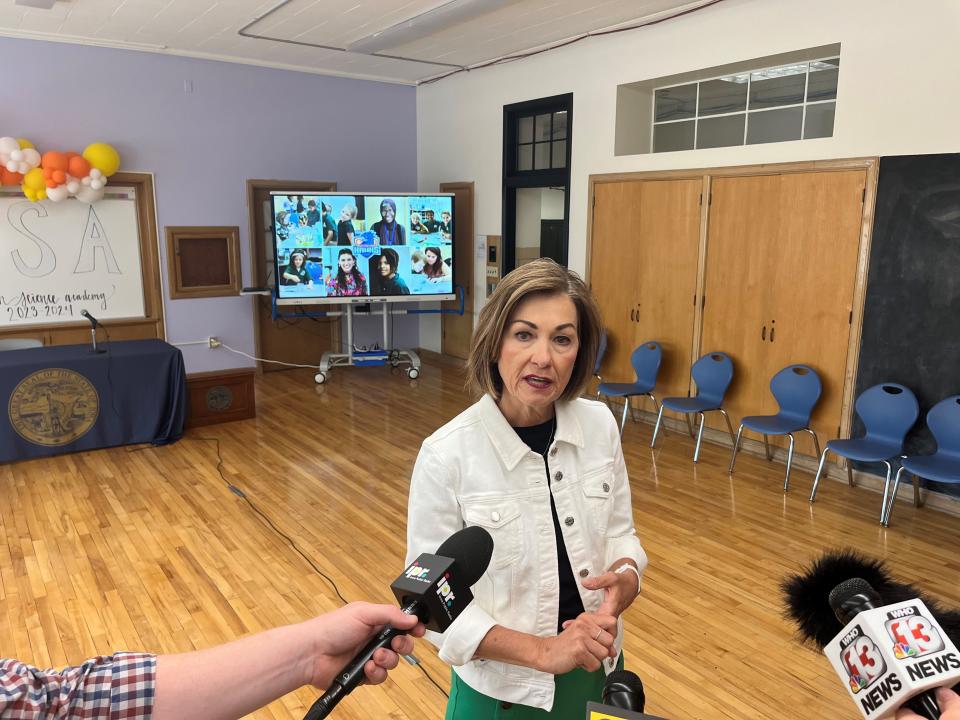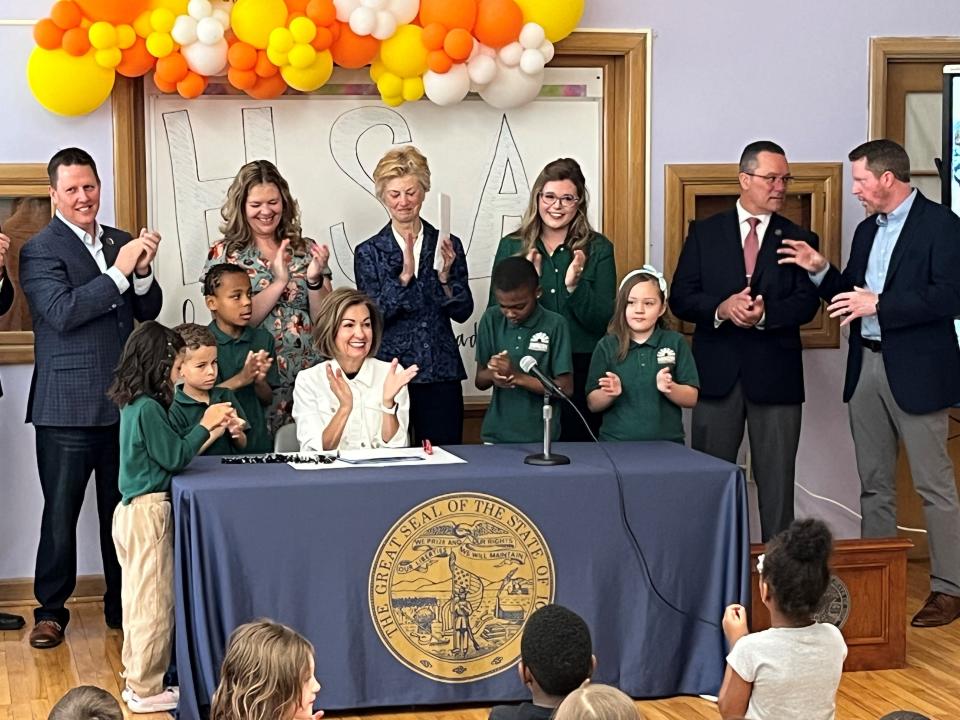Kim Reynolds vetoes changes to Iowa's open meetings law as she signs final bills of 2024
- Oops!Something went wrong.Please try again later.
In her only veto of the session, Gov. Kim Reynolds has rejected a bill intended to increase penalties for violating open-meetings laws, saying it could cause confusion by changing the definition of what counts as a meeting.
The Friday afternoon veto was one of the final actions Reynolds took on bills that passed the Iowa Legislature's 2024 session as she wrapped up legislative business for the year with a final round of bill signings.
The governor had 30 days from the end of the legislative session on April 20 to sign or veto every bill sent to her desk.
In all, Reynolds signed 185 of the 188 bills passed by the Iowa Legislature this year. Lawmakers also passed two proposed amendments to the Iowa Constitution that do not require the governor's signature.

More: Our look at the biggest bills that passed and failed in the Iowa Legislature's 2024 session
Why did Kim Reynolds veto the change to Iowa's open meetings law?
House File 2539 would have increased the penalties for Iowa officials who violate Iowa's open meetings laws by increasing the fines for violating the law and allowing officials who repeatedly violate the law to be removed from office by a judge.
The bill also would have changed the definition of "meeting" to specify that it does not apply to "a gathering including members of a local governmental body that is hosted or organized by a political party, political candidate or civic organization."
Iowa's existing law already allows officials to gather "for purely ministerial or social purposes when there is no discussion of policy or no intent to avoid the purposes of this chapter." The bill's new language would have been in addition to those current exceptions.
"Although well-intentioned, the amendment to the definition is unnecessary and will cause confusion," Reynolds wrote in a veto message. "Open meeting laws need to be clear, otherwise their application and enforcement will be inconsistent and varied."
The original legislation also included a requirement that elected and appointed officials receive training on their duties under Iowa's open meetings laws. The requirement was amended out of the final version of the bill. Reynolds called that policy "a laudable goal" that she hopes lawmakers continue to pursue next year.
She said she is committed to working with the Iowa Legislature and others on making Iowa's open meeting laws stronger.
Randy Evans, executive director of the Iowa Freedom of Information Council, had urged Reynolds to veto the bill, saying it would have caused "a serious erosion" of Iowa's history of open and transparent meetings.
"Such a change opens the door for a quorum of members of a school board to gather at a chamber of commerce dinner and discuss and deliberate on their school district’s curriculum or textbook acquisition policies," Evans wrote in a May 14 letter to Reynolds. "Or a majority of members of a city council could come together at a United Way reception and discuss changes to their city’s standard agreement for development incentives."
Gov. Kim Reynolds signs charter school bill Friday morning
Reynolds visited Horizon Science Academy in Des Moines Friday morning to sign a bill providing more funding to charter schools and allowing charter schools or private schools to buy unused school buildings.
The K-3 school — Iowa's first charter school in more than a decade — opened last August. The new school was made possible by a 2021 law signed by Reynolds making it easier for charter schools to form in Iowa. Now, she's expanding on that legislation.

Senate File 2368 allows public charter schools in Iowa to receive state per-pupil funds for professional development and early intervention, in addition to the regular per-pupil funds they already receive.
The law also says that school districts seeking to sell unused buildings must sell to other educational institutions, like charter schools or private schools, if they represent the highest bid for the property.
"Charter schools provide another school choice for parents and guardians looking for the education that is best suited for their children's abilities and needs," Reynolds said.
At the Horizon event, Reynolds also announced she would use $7 million in federal American Rescue Plan funding to create a new grant program for charter schools looking to build new facilities or expand existing ones.
The program will open for applications June 3 through the Iowa Department of Education. Charter schools are eligible for $500,000 to go toward building new schools and $200,000 to expand or repair existing facilities.
Ashley Ruppert, whose daughter attends kindergarten at Horizon, said she appreciates the individualized attention that students receive, and education in specialized areas like coding.
"I enjoy charter schools because of smaller class sizes," she said. "I feel like my daughter has that one-on-one education."
What are some other bills Kim Reynolds signed in the final week?
Other notable bills signed by Reynolds in the final week include:
House File 2364, which requires the state to research and develop recommendations to make state parks more accessible for people with disabilities.
House File 2545, which requires social studies standards to include instruction on government, civics and "exemplary figures and important events in Western civilization, the United States and the state of Iowa."
House File 2605, which regulates consumable hemp products in Iowa by limiting how much THC can be in a serving and limiting purchases to those 21 and over.
House File 2652, which allows schools to use professional development funds to pay for training for staff members to obtain a professional permit to carry weapons.
House File 2681, which places new regulations on automated traffic enforcement cameras around the state.
Senate File 2385, which eliminates dozens of Iowa boards and commissions as part of Reynolds' push to shrink state government.
Senate File 2391, which requires specific labels for lab-grown and plant-based meat and egg alternatives.
Stephen Gruber-Miller covers the Iowa Statehouse and politics for the Register. He can be reached by email at sgrubermil@registermedia.com or by phone at 515-284-8169. Follow him on Twitter at @sgrubermiller.
This article originally appeared on Des Moines Register: Gov. Kim Reynolds vetoes Iowa open meetings law changes

